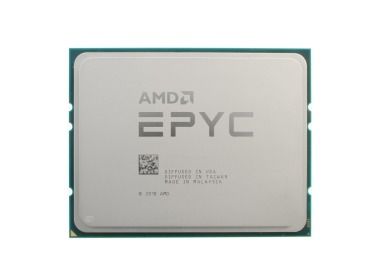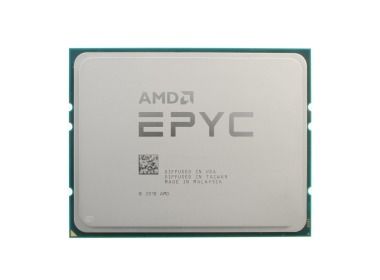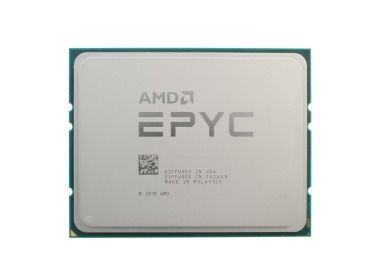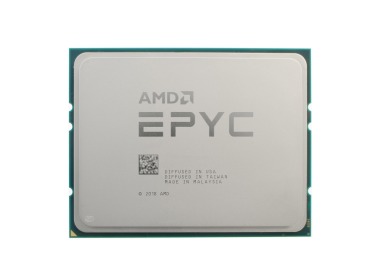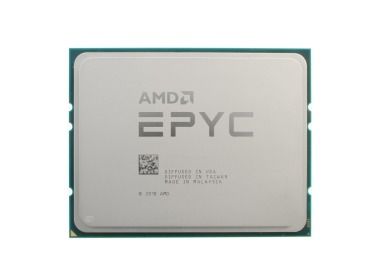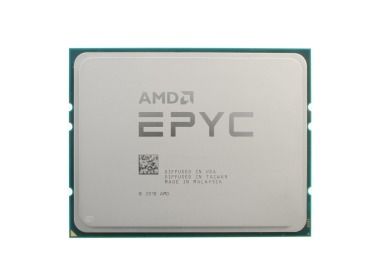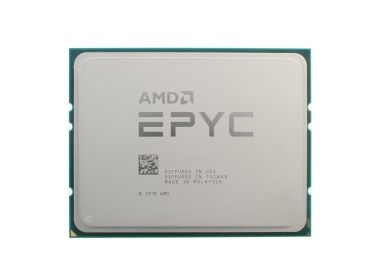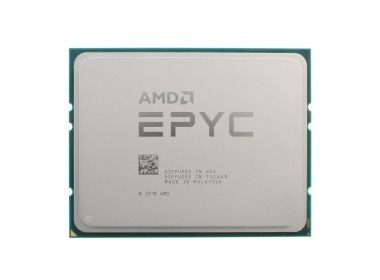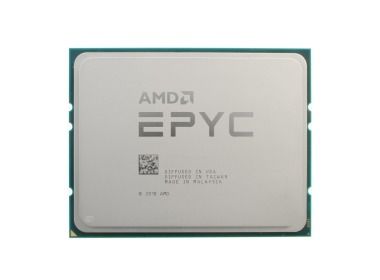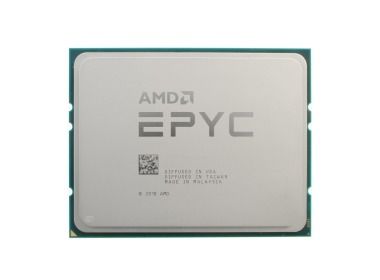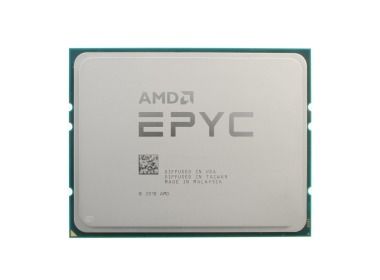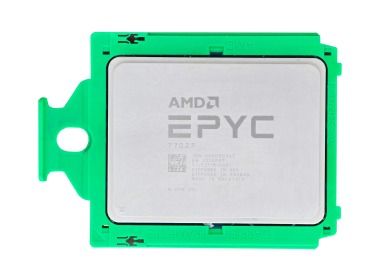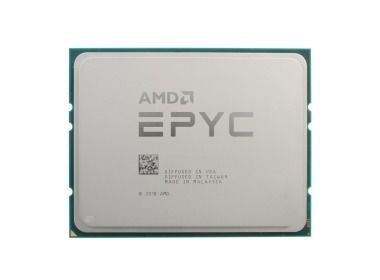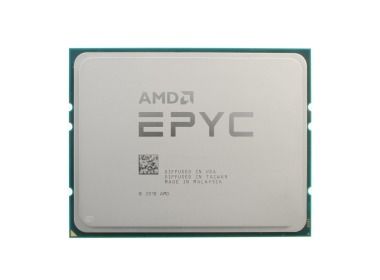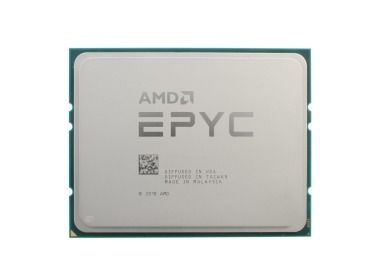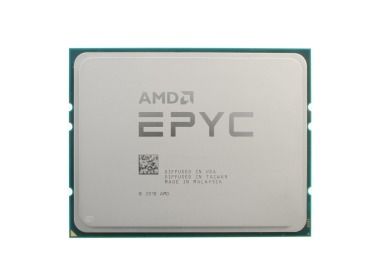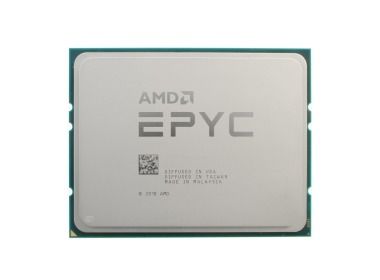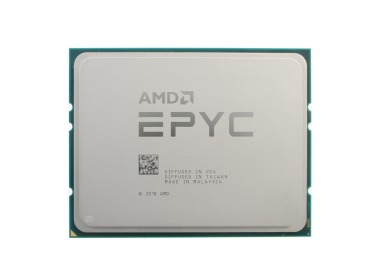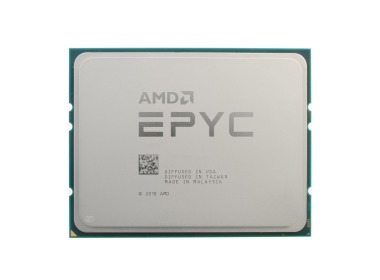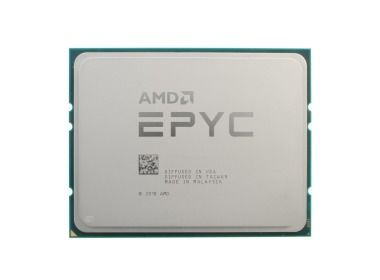- Processor AMD EPYC 7262 8-core 3.2GHz 128MB 155W 100-000000041Technical parameters: Core Count - 8 Number of threads - 16 Base clock frequency - 3.2GHz Turbo clock frequency - 3.4GHz Cache - 128MB Lithography - 7nm TDP ...Calculating delivery time...In stock 5Warranty 12 monthsPLN 569.99 PLN 463.41
- Processor AMD EPYC DELL ONLY 7252 8-core 3.1GHz 64MB 120W 100-000000080Technical parameters: Core Count - 8 Number of threads - 16 Base clock frequency - 3.1GHz Turbo clock frequency - 3.2GHz Cache - 64kB Lithography - 7nm TDP -...Calculating delivery time...In stock 5Warranty 12 monthsPLN 650.01 PLN 528.46
- Processor AMD AMD EPYC™ 7252 8-core 3.1GHz 64MB 120W 100-000000080Technical parameters: Core Count - 8 Number of threads - 16 Base clock frequency - 3.1GHz Turbo clock frequency - 3.2GHz Cache - 64MB Lithography - 7nm TDP -...Warranty 12 monthsPLN 670.01 PLN 544.72Out of stock
- Processor Dell EPYC 7402 DELL ONLY 24-core 2.8GHz 128MB 180W 100-000000046-DELLTechnical parameters: Core Count - 24 Number of threads - 48 Base clock frequency - 2.8GHz Turbo clock frequency - 3.35GHz Cache - 128MB Lithography - 7nm TD...Calculating delivery time...In stock 8Warranty 12 monthsPLN 850.00 PLN 691.06
- Processor AMD EPYC 7401P 24-core 2GHz 64MB 170W PS740PBEVHCAFTechnical parameters: Core Count - 24 Number of threads - 48 Base clock frequency - 2GHz Turbo clock frequency - 3GHz Cache - 64MB Lithography - 14nm TDP - 1...Warranty 12 monthsPLN 850.00 PLN 691.06Out of stock
- Processor Dell EPYC 7351P 16-core 2.4GHz 64MB 170W PS735PBEVGPAF-DELLTechnical parameters: Core Count - 16 Number of threads - 32 Base clock frequency - 2.4GHz Turbo clock frequency - 2.9GHz Cache - 64MB Lithography - 14nm TDP...Calculating delivery time...In stock 8Warranty 12 monthsPLN 1,000.00 PLN 813.01
- Processor AMD AMD EPYC 7302 16-core 3GHz 128MB 155W 100-000000043Technical parameters: Core Count - 16 Number of threads - 32 Base clock frequency - 3GHz Turbo clock frequency - 3.3GHz Cache - 128MB Lithography - 7nm TDP -...Warranty 12 monthsPLN 1,100.00 PLN 894.31Out of stock
- Processor AMD AMD EPYC™ 7001 Series 16-core 2.4GHz 64MB 170W PS735PBEVGPAFTechnical parameters: Core Count - 16 Number of threads - 32 Base clock frequency - 2.4GHz Turbo clock frequency - 2.9GHz Cache - 64MB Lithography - 14nm TDP...Calculating delivery time...In stock 1Warranty 12 monthsPLN 1,210.00 PLN 983.74
- Processor AMD EPYC 7371 16-core 3.1GHz 64MB 200W PS7371BDVGPAFTechnical parameters: Core Count - 16 Number of threads - 32 Base clock frequency - 3.1GHz Turbo clock frequency - 3.8GHz Cache - 64MB Lithography - 14nm TDP...Warranty 12 monthsPLN 1,250.00 PLN 1,016.26Out of stock
- Processor AMD EPYC 7502 32-core 2.5GHz 128MB 180W 100-000000054Technical parameters: Core Count - 32 Number of threads - 64 Base clock frequency - 2.5GHz Turbo clock frequency - 3.35GHz Cache - 128MB Lithography - 7nm TD...Calculating delivery time...Warranty 12 monthsPLN 1,500.00 PLN 1,219.51
- Processor AMD EPYC 7702P 64-core 2GHz 256MB 200W 100-000000047Technical parameters: Core Count - 64 Number of threads - 128 Base clock frequency - 2GHz Turbo clock frequency - 3.35GHz Cache - 256MB Lithography - 7nm TDP...Warranty 12 monthsPLN 1,690.00 PLN 1,373.98Out of stock
- Processor AMD EPYC 7313 16-core 3GHz 128MB 155W 100-000000329Technical parameters: Core Count - 16 Number of threads - 32 Base clock frequency - 3GHz Turbo clock frequency - 3.7GHz Cache - 128MB Lithography - 7nm TDP -...Warranty 12 monthsPLN 1,749.99 PLN 1,422.76Out of stock
- Processor AMD EPYC DELL ONLY 7702P 64-core 2GHz 256MB 200W 100-000000047-DELLTechnical parameters: Core Count - 64 Number of threads - 128 Base clock frequency - 2GHz Turbo clock frequency - 3.35GHz Cache - 256MB Lithography - 7nm TDP...Calculating delivery time...In stock 38Warranty 12 monthsPLN 1,749.99 PLN 1,422.76
- Processor AMD EPYC 7702P 64-core 2GHz 256MB 200W 100-000000047-LENOVOTechnical parameters: Core Count - 64 Number of threads - 128 Base clock frequency - 2GHz Turbo clock frequency - 3.35GHz Cache - 256MB Lithography - 7nm TDP...Warranty 12 monthsPLN 1,749.99 PLN 1,422.76Out of stock
- Processor AMD EPYC 7452 32-core 2.35GHz 128MB 155W 100-000000057Technical parameters: Core Count - 32 Number of threads - 64 Base clock frequency - 2.35GHz Turbo clock frequency - 3.35GHz Cache - 128MB Lithography - 7nm T...Warranty 12 monthsPLN 2,010.00 PLN 1,634.15Out of stock
- Processor AMD EPYC 7352 DELL ONLY 24-core 2.3GHz 128MB 155W 100-000000077-DELLTechnical parameters: Core Count - 24 Number of threads - 48 Base clock frequency - 2.3GHz Turbo clock frequency - 3.2GHz Cache - 128MB Lithography - 7nm TDP...Warranty 12 monthsPLN 2,650.00 PLN 2,154.47Out of stock
- Processor AMD EPYC 7352 24-core 2.3GHz 128MB 155W 100-000000077Technical parameters: Core Count - 24 Number of threads - 48 Base clock frequency - 2.3GHz Turbo clock frequency - 3.2GHz Cache - 128MB Lithography - 7nm TDP...Calculating delivery time...In stock 1Warranty 12 monthsPLN 2,650.00 PLN 2,154.47
- Processor AMD EPYC 7313 DELL ONLY 16-core 3GHz 128MB 155W 100-000000329-DELLTechnical parameters: Core Count - 16 Number of threads - 32 Base clock frequency - 3GHz Turbo clock frequency - 3.7GHz Cache - 128MB Lithography - 7nm TDP -...Warranty 12 monthsPLN 2,800.00 PLN 2,276.42Out of stock
- Processor AMD EPYC 7543 32-core 2.8GHz 256MB 225W 100-000000345Technical parameters: Core Count - 32 Number of threads - 64 Base clock frequency - 2.8GHz Turbo clock frequency - 3.7GHz Cache - 256MB Lithography - 7nm TDP...PLN 3,450.00 PLN 2,804.88Out of stock
- Processor AMD EPYC 9754 128-core 2.25GHz 256MB 360W 100-000001234-DELLTechnical parameters: Core Count - 128 Number of threads - 256 Base clock frequency - 2.25GHz Turbo clock frequency - 3.1GHz Cache - 256MB Lithography - 5nm ...Calculating delivery time...In stock 2Warranty 12 monthsPLN 11,800.01 PLN 9,593.50
- Processor AMD EPYC 9754 128-core 2.25GHz 256MB 360W 100-000001234Technical parameters: Core Count - 128 Number of threads - 256 Base clock frequency - 2.25GHz Turbo clock frequency - 3.1GHz Cache - 256MB Lithography - 6nm ...Warranty 12 monthsPLN 12,000.00 PLN 9,756.10Out of stock
For years, one player dominated the server market. Today, however, you can't talk about a modern data center without considering AMD. AMD EPYC processors are not just about more cores and threads – they represent a completely different approach to architecture. Socket SP3, 128 PCIe lanes, eight-channel DDR4 memory, a gigantic L3 cache, and energy efficiency that truly makes a difference. At Hardware Direct, you'll find EPYCs in 16, 24, 32, and even 64-core versions – ready for 24/7 operation, tested, and covered by warranty. If you're looking for computing power without overpaying, you're in the right place.
Why is AMD EPYC the Most Sensible Choice for Servers Today?
If you're counting on real scalability, AMD has no competition today. Even in single-socket models (like the 7302P or 7702P), you get more cores than Intel offers in a dual-socket configuration.
128 PCIe 4.0 lanes, full support for 8-channel DDR4 3200 MHz memory, support for ECC, Secure Memory Encryption, SEV – and all this without any "licenses" or artificial limitations. Need a backup server? Go for the 7313P. Need a host for 400 VMs? Opt for the 7702P. Looking for a platform for VDI or machine learning? The EPYC 7373X with 3D V-Cache will make your day. There are truly no bad choices here – only more cost-effective ones.
AMD EPYC Processors – Two Architectures, Many Scenarios: Naples and Milan in Practice
Hardware Direct's offerings are dominated by two architectures: Naples (EPYC 7001) and Milan (EPYC 7003). The former, like the EPYC 7401P or 7351P, are inexpensive and solid solutions for classic virtualizers – 24 or 32 cores, 64 MB cache, and a price often below 1,000 PLN gross. Milan – that's another league: Zen 3, a significant IPC increase, support for the latest SP3 motherboards, and PCIe 4.0 compatibility. An example? The EPYC 7313 (16C/32T) – ideal for a hypervisor with plenty of RAM, or the EPYC 7702P (64C/128T) – a beast for Kubernetes clusters, rendering, and simulations. Each of these models will work in Dell, Supermicro, ASUS, as well as in non-reference barebone platforms.
What is EPYC Best For? From Backup to AI and Containers
AMD EPYC processors are workhorses – literally. You don't choose them to sit idle and look pretty. They are meant to compute. Need a server for backup and storage? Choose the 7302P – a single unit is enough to access 8 RAM channels and 16 NVMe drives. Building a host for Proxmox or VMware? The 7402P will handle 256 GB of RAM without breaking a sweat. And if you're aiming for CFD simulations, an AI computation server, or large NoSQL databases – the 7373X with 3D V-Cache (768 MB L3!) will be your greatest ally. You won't find another CPU that tackles such tasks with such ease.
SQL, Backup, Render? Choose Your EPYC Processor Wisely
What to choose for a specific application?
- For database servers (PostgreSQL, MS SQL, Oracle), models with high clock speeds and large caches – like the EPYC 7313 (3.0 GHz, 16C/32T) or EPYC 7443P (24C/48T, 128 MB L3) – are best. They provide fast responses, scale indexes excellently, and don't choke under intensive queries.
- If your priority is backup, archiving, and storage, go for the EPYC 7402P or 7302P – they have plenty of PCIe lanes for RAID controllers, SAS/NVMe drives, and inexpensive ECC RAM.
- For tasks related to rendering (Blender, V-Ray, Adobe After Effects) or CFD, FEM, or AI/ML simulations, choose units with a high core count and capacious cache – like the EPYC 7702P (64C/128T) or EPYC 7373X with 768 MB 3D V-Cache, which will handle a render farm or TensorFlow clusters without a hiccup.
In short: there's plenty to choose from – and each of these CPUs makes sense, provided you know what you expect from it.
Hardware Direct's Offer – Ready, Tested, No Surprises
When buying an EPYC from Hardware Direct, you're not buying a pig in a poke. Each processor is tested, checked for compatibility with the SP3 socket and Dell/Supermicro motherboards, and each comes with a 12-month warranty and full support – including cooling matching, BIOS advice, and RAM compatibility. The EPYC 7702P for just under 1,600 PLN, the 7313 for approx. 950 PLN gross – these are numbers that appeal to the finance department as much as to the admin. Additionally: 24h shipping, VAT invoice, and 100% real availability from our warehouse, not from a dream catalog. This isn't an outlet – it's a warehouse of ready-to-work solutions.








